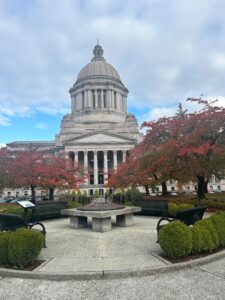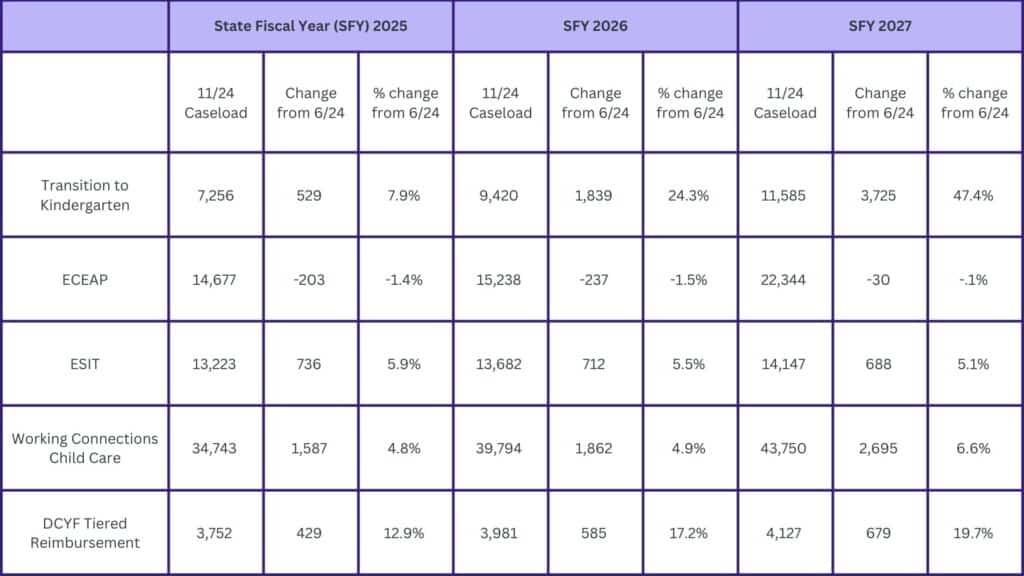
The Capitol building on a calm October day.
(Photo Credit: Erica Hallock)
Trivia!
Who cast the first Electoral vote for Ronald Reagan in the 1976 election? Hint: they are a current Washington State Senator.
Bonus Question: What did former Governor John Spellman call this now State Senator and his then-group of House Republican colleagues during the 1982 state budget crisis?
State Budget Shortfall Woes to Dominate 2025 Legislative Session
With the 2025 legislative session right around the corner, all attention is on the state’s growing budget shortfall. Here are some resources and context to help understand Washington’s precarious financial situation.
OFM Director Calls on State Agencies to Prepare Budget Reductions:
On November 8, Office of Financial Management (OFM) Director Pat Sullivan released a memo to state agency directors, statewide elected officials and presidents of higher educational institutions directing them to work with their OFM analyst to propose budget reduction options for the 2025 supplemental budgets and the 2025-27 biennial budgets by November 15, 2024.
In the memo, Director Sullivan projects a budget deficit ranging from $10-12 billion over the four-year outlook. In short, the state’s current revenue is insufficient to meet current commitments.
Director Sullivan suggests agencies consider actions that will produce immediate savings such as hiring freezes, delaying programs that have not yet been implemented, identifying under-expenditures and use of non-State General Fund wherever possible.
On November 19, the OFM website was updated to include a Budget Reduction FAQ and on November 20, the site was updated to include the various state agency budget reduction options. It is important to emphasize these are all just options and the budget writing process has just begun. If an item is on one of these lists, it does not mean a reduction is imminent.
Resources: To learn more about Washington’s fiscal outlook, here are a few resources.
- The Washington State Standard has a helpful article describing the situation. The Washington Research Council produced a brief “Anatomy of the Projected State Budget Shortfall” that highlights their perspective on the matter.
- The WA Research Council also prepared “Washington Faces an Estimated $5.1 Billion Shortfall” that includes interesting data. (Note that the projected shortfall has grown since release of this brief, but the underlying information is informative).
- Finally, the Research Council posted a blog specifically focused on the Fair Start for Kids Act budget implications.
State Revenue Forecast:
On November 20, the Washington State Economic and Revenue Forecast Council met to receive the latest revenue forecast from its Executive Director, Dave Reich. The bottom line is Near- General Fund collections are down $400 million through 2029 from the September 2024 forecast.
This breaks down as:
- 2023-25 biennium (current): (-$89M)
- 2025-27 biennium: (-$181M)
- 2027-29 biennium: ($-131M)
The primary reasons for the drop in revenue, that continue to be lower than forecasted, are retail sales and reduced Business and Occupation Tax collections. The forecast suggests that reduced inflation and lower interest rates will lead to improved revenue growth. So, good news on the horizon, hopefully.
Overall state revenues are projected to grow 2.6% between the 2021-23 and 2023-25 biennia and by 7.6% between 2023-25 and 2025-27 biennia.
When asked about plans for Governor Inslee’s final budget, OFM Director Pat Sullivan replied that they are considering the release of a “book one” budget consisting of all-cuts as well as a “book two” budget that would offset some of the cuts with new revenue. Additionally, Sullivan noted that much of the drivers of the budget crunch lie in increased costs in maintenance level expenses and he specifically cited new expenses coming online for the Fair Start for Kids Act for Working Connections Child Care and ECEAP. Finally, Sullivan noted that overall state revenue for the upcoming 2025-27 biennium is down about $1 billion from earlier projections, further challenging the budget process.
Senate Ways and Means Chair June Robinson and House Appropriations Chair Timm Ormsby were asked about their approaches to the budget crisis. Both chairs responded that they are weighing a range of options, including evaluating recommendations from state agencies, recommendations they will receive from the outgoing and incoming Governor, revenue options as well as potentially delaying any ramp-ups of new programs slated to go on-line.
Next Steps for State Budget:
Outgoing Governor Jay Inslee will release one final budget in mid-December. Per state law, he is required to submit a balanced budget. With our state’s projected deficit, he can meet this requirement by proposing budget cuts, new revenue, or a combination of the two. We will be producing a summary of this budget following its release.
Incoming Governor Bob Ferguson will also have a chance to put his mark on the budget, but given the timing and the scarcity of funding, it is highly likely he will rely on Governor Inslee’s budget as a base.
State Election Results
In what can only be deemed as NON-breaking news, the following is a brief recap of some of the key take-aways from the state election results:
- Governor-Elect Ferguson hitting the ground running. Shortly after it was clear he was heading from the Attorney General’s Office (AG) to the 2nd Floor of the Legislative Building, Governor-Elect Bob Ferguson announced his senior staff, most of whom he is bringing over from the AG’s office. He also announced a 53-member transition team designed to assist him in preparing for his new role. Note their first meeting is scheduled for Friday, November 22nd – the same day you are receiving this newsletter.
- Capital Gains Funding Preserved. More than 64% of Washingtonians voted to preserve capital gains funding to support investments in education, including in early learning.
- New State Senate Leadership. On November 11th, Senate Democrats selected Senator Jamie Pedersen from the 43rd Legislative District in Seattle to serve as its Senate Majority Leader. Senator Pedersen assumes this role after Senate Majority Leader Andy Billig of Spokane announced he would not seek re-election. With this appointment, Washington is the first state in the nation to have both of its chambers led by LGBTQ+ leaders at the same time!
- New Addition to House Leadership. Earlier this week, House Democrats voted to affirm the leadership of Speaker Laurie Jinkins from the 27th Legislative District in Tacoma as well as Majority Leader Joe Fitzgibbon from the 34th Legislative District in Burien. They also elected Representative Chris Stearns from the 47th Legislative District in Auburn to serve as the new Speaker pro tempore.
- Democrats pick up one seat in the Senate and one in the House. While the Senate race in the 18th Legislative District is still close and will likely go to a recount, it does appear that the Democrats picked up one seat in both the Senate and the House. If Adrian Cortes prevails over Brad Benton in the 18th Legislative District Senate race, Democrats will hold a 30-19 advantage in the Senate and Democrats will hold a 59-39 advantage in the House (the Democrats picked up a seat in the House in the 26th legislative district when Adison Richards defeated Jesse Young for an open seat that was previously held by Republican Spencer Hutchins who decided not to run for re-election).
- More legislative changes coming. We’re not quite done yet with the moving chairs. A new Senator will need to be appointed in the 26th legislative district as sitting Senator Emily Randall was elected to Congress. In addition, Senator Karen Keiser of the 33rd legislative district is expected to resign shortly, and her seat will need to be filled. Finally, the seat of Senator Patty Kuderer of the 48th Legislative District will need to be filled after she was elected as the incoming state Insurance Commissioner. Of course, if any of the seats are filled by House members, the process to fill the House seats will begin.
- Committee Configurations and Assignments. We expect announcements shortly about legislative committee structures, membership and timing. Stay tuned!
Updated Caseload Forecast Released
On November 13, the Washington state Caseload Forecast Council met to release the latest projected caseloads for entitlement programs. The caseload forecasts help project what the state will need to budget for programs ranging from K-12 enrollment to Medicaid to prisons. Together with the revenue forecast, this data will inform the Governor’s budget that will be released in mid-December.





